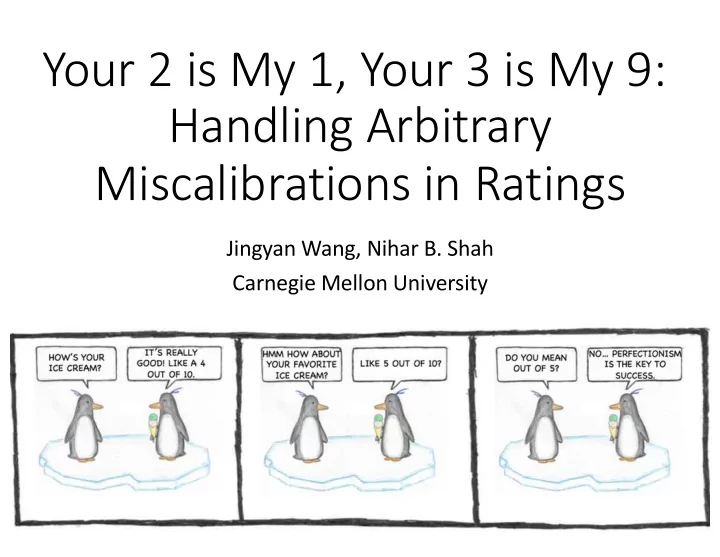

Your 2 is My 1, Your 3 is My 9: Handling Arbitrary Miscalibrations in Ratings Jingyan Wang, Nihar B. Shah Carnegie Mellon University
Miscalibration People have different scales when giving numerical scores. reviewing papers grading essays rating products Arbitrary Miscalibrations in Ratings Wang & Shah 1
People are miscalibrated strict lenient extreme moderate …… …… Arbitrary Miscalibrations in Ratings Wang & Shah 2
Miscalibration • Ammar et al. 2012 “The rating scale as well as the individual ratings are often arbitrary and may not be consistent from one user to another.” • Mitliagkas et al. 2011 “A raw rating of 7 out of 10 in the absence of any other information is potentially useless.” What should we do with these scores? Arbitrary Miscalibrations in Ratings Wang & Shah 3
Two approaches in the literature 1. Assume simplified models for calibration [Paul 1981, Flach et al. 2010, Roos et al. 2011, Baba and Kashima 2013, Ge et al. 2013, MacKay et al. 2017] • People are complex [e.g. Griffin and Brenner 2008] • Did not work well in practice: “We experimented with reviewer normalization and generally found it significantly harmful.” — John Langford (ICML 2012 program co-chair) 2. Use rankings [Rokeach 1968, Freund et al. 2003, Harzing et al. 2009, Mitliagkas et al. 2011, Ammar et al. 2012, Negahban et al. 2012] • Use rankings induced from the scores or directly collect rankings • Commonly believed to be the only useful information, if no assumptions on calibration Arbitrary Miscalibrations in Ratings Wang & Shah 4
Folklore belief Freund et al. 2003 “[Using rankings instead of ratings] becomes very important when we combine the rankings of many viewers who often use completely different ranges of scores to express identical preferences.” Is it possible to do better than rankings with essentially no assumptions on the calibration? Arbitrary Miscalibrations in Ratings Wang & Shah 5
Simplified setting Calibration function 𝑔 " : 0, 1 → [0, 1] 𝑦 & ∈ [0, 1] 1 Gives score 𝑔 " 𝑦 / for 𝑗 ∈ {𝐵, 𝐶} Calibration function 𝑔 $ : 0, 1 → [0, 1] 𝑦 ' ∈ [0, 1] 2 Gives score 𝑔 $ 𝑦 / for 𝑗 ∈ {𝐵, 𝐶} • 𝑔 " , 𝑔 $ are strictly monotonic • Adversary chooses 𝑦 & , 𝑦 ' and strictly monotonic 𝑔 " , 𝑔 $ • Papers assigned to reviewers at random Arbitrary Miscalibrations in Ratings Wang & Shah 6
Simplified setting Calibration function 𝑔 " : 0, 1 → [0, 1] 𝑦 & ∈ [0, 1] 1 Gives score 𝑔 " 𝑦 / for 𝑗 ∈ {𝐵, 𝐶} Calibration function 𝑔 $ : 0, 1 → [0, 1] 𝑦 ' ∈ [0, 1] 2 Gives score 𝑔 $ 𝑦 / for 𝑗 ∈ {𝐵, 𝐶} • Goal: infer 𝑦 & > 𝑦 ' or 𝑦 & < 𝑦 ' ? • Eliciting ranking vacuous: random guessing baseline • 𝑧 / denotes score given by reviewer 𝑗 ∈ {1, 2} Given 𝑧 " , 𝑧 $ , assignment , is it possible to infer 𝑦 & > 𝑦 ' or 𝑦 & < 𝑦 ' better than random guessing? Arbitrary Miscalibrations in Ratings Wang & Shah 7
Impossibility? Intuition: The reported scores can be either due to x, or due to f. 𝑧 " = 0.5 𝑦 & 1 𝑦 ' 𝑧 $ = 0.8 2 Case I: Case II: 𝑔 " 𝑦 = 𝑦 𝑔 " 𝑦 = 𝑦/2 𝑦 & = 1 𝑦 & = 0.5 𝑔 $ 𝑦 = 𝑦 𝑔 $ 𝑦 = 𝑦 𝑦 ' = 0.8 𝑦 ' = 0.8 ⇒ 𝑦 & > 𝑦 ' ⇒ 𝑦 & < 𝑦 ' Arbitrary Miscalibrations in Ratings Wang & Shah 8
Impossibility… for deterministic algorithms Theorem: No deterministic algorithm can always be strictly better than random guessing. • Stein’s paradox [Stein 1956] • Empirical Bayes [Robbins 1956] • Two envelope problem [Cover 1987] Arbitrary Miscalibrations in Ratings Wang & Shah 9
Proposed algorithm Algorithm: The paper with the higher score is better, with probability "G H I JH K . $ Theorem: This algorithm uniformly and strictly outperforms random guessing. Scores > rankings! Arbitrary Miscalibrations in Ratings Wang & Shah 10
Intuition Algorithm: The paper with the higher score is better, with probability "G H I JH K . $ 𝒚 𝑩 = 𝟏 𝒚 𝑪 = 𝟐 Arbitrary Miscalibrations in Ratings Wang & Shah 11
Intuition Algorithm: The paper with the higher score is better, with probability "G H I JH K . $ 𝒈 𝟐 𝒚 𝑩 = 𝟏 0.1 𝒚 𝑪 = 𝟐 0.3 Arbitrary Miscalibrations in Ratings Wang & Shah 11
Intuition Algorithm: The paper with the higher score is better, with probability "G H I JH K . $ 𝒈 𝟐 𝒈 𝟑 𝒚 𝑩 = 𝟏 0.1 0.5 𝒚 𝑪 = 𝟐 0.3 0.9 Arbitrary Miscalibrations in Ratings Wang & Shah 11
Intuition Algorithm: The paper with the higher score is better, with probability "G H I JH K . $ 𝒈 𝟐 𝒈 𝟑 𝒚 𝑩 = 𝟏 0.1 0.5 𝒚 𝑪 = 𝟐 0.3 0.9 • Under blue assignment, output paper B with probability 1 + 0.1 − 0.9 = 0.9 2 • Under red assignment, output paper A with probability 1 + 0.3 − 0.5 = 0.6 2 • On average, correct with probability 0.9 + (1 − 0.6) = 0.65 > 0.5 2 Arbitrary Miscalibrations in Ratings Wang & Shah 11
Extensions • A/B testing and ranking • Noisy setting Arbitrary Miscalibrations in Ratings Wang & Shah 12
Take-aways • Scores > rankings in presence of arbitrary miscalibration • Randomized decisions good for both inference and fairness [Saxena et al. 2018] Arbitrary Miscalibrations in Ratings Wang & Shah 13
Recommend
More recommend